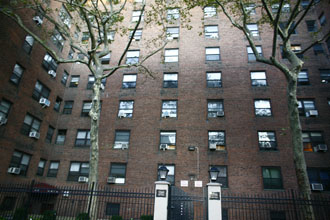In a decision that could reverberate throughout New York’s sprawling rental market, a judge ruled today that the owner of NYC’s enormous Stuyvesant Town and Peter Cooper Village apartment complexes will have to pay back some $200 million to tenants.
In our July/August issue, Adam Matthews reported on a trend known as “predatory equity,” wherein private equity partnerships would buy undervalued housing developments, take out big loans against their value—including a good chunk of change for themselves—and then fix and flip the properties. In doing so, the partnerships would bleed the equity out of affordable developments and put them at risk of foreclosure.
In that case, a partnership led by businessman Larry Gluck had purchased and then refinanced Harlem’s Riverton Houses, intending to remodel units with pretty kitchen and bath fixtures and then jack up rents on rent-stabilized tenants. But when the market tanked, Riverton ended up mired in debt. Dina Levy, a tenant organizer with New York City’s Urban Homesteading Assistance Board, told Matthews that such deals had left roughly 70,000 affordable units overleveraged.
The case reported by the Times this week involved a partnership comprised of BlackRock and Tishman Speyer Properties, which purchased the property in 2006. Metropolitan Life, the former owner, was also named. The new owners took a big hit in the downturn; more than half of their development’s $5.4 million sticker price has evaporated into thin air. And now it appears they’ll have to pay back rent to boot.
Rent control in New York is a tricky thing; according to the Times:
Under state law, landlords can deregulate an apartment when the rent for a vacant unit reaches $2,000 or more per month, or the rent is above $2,000 and a tenant’s household income is above $175,000 for two consecutive years.
Still, it’s estimated that the decision could affect some 80,000 apartments in New York City.















